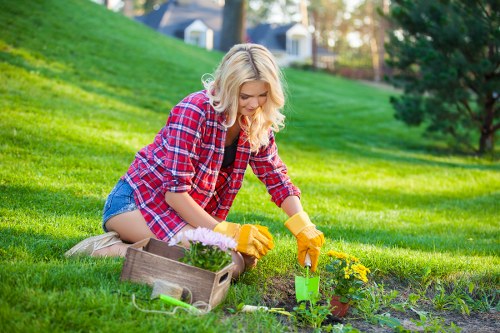Driveway Algae Removal in Hampstead: Keep Your Driveway Clean and Safe

Driveways are an essential part of any home, providing a convenient entry point and enhancing the curb appeal of your property. However, over time, algae can begin to grow on your driveway, creating unsightly stains and making the surface slippery and hazardous. In Hampstead, where the climate can be conducive to algae growth, maintaining a clean driveway is crucial for both aesthetic and safety reasons.
Algae thrive in damp, shaded environments, making driveways that receive limited sunlight ideal breeding grounds. The presence of algae not only detracts from the beauty of your home but can also lead to more significant issues, such as surface degradation and increased slipperiness, which can pose risks, especially during wet conditions.
Addressing algae growth promptly can prevent long-term damage to your driveway and ensure that it remains a safe and attractive feature of your property.
Understanding Algae Growth on Driveways

Algae are simple, plant-like organisms that thrive in moist environments. On driveways, they typically appear as green or black slimes, which can make the surface look dull and worn. Understanding the conditions that promote algae growth can help homeowners take proactive steps to prevent and eliminate it.
The primary factors that contribute to algae growth include moisture, shade, and organic debris. Areas of your driveway that are shaded by trees or buildings are more likely to retain moisture, creating an ideal environment for algae to flourish. Additionally, leaves, dirt, and other debris can accumulate on the driveway, providing nutrients that algae need to grow.
Regular maintenance and cleaning are essential to disrupt these conditions and keep algae at bay.
Causes of Algae Growth in Hampstead
Hampstead's climate, characterized by its dampness and occasional shade from surrounding trees, creates favorable conditions for algae growth. Frequent rainfall and humidity levels can keep driveways moist, especially in areas where sunlight doesn't reach effectively.
Additionally, certain materials used in driveway construction can either resist or promote algae growth. Porous surfaces like concrete and asphalt are more susceptible to retaining moisture, while sealed or treated surfaces can offer better protection against algae.
Understanding these causes is the first step in selecting the most effective algae removal and prevention strategies for your driveway.
The Impact of Algae on Your Driveway
Beyond the cosmetic concerns, algae can have significant impacts on the integrity and safety of your driveway. Algae growth can make the surface slippery, increasing the risk of slips and falls, especially when the driveway is wet.
Furthermore, persistent algae can lead to the deterioration of driveway materials. The organic matter can break down surface seals and pavers, leading to cracks, potholes, and other structural issues that may require costly repairs.
By addressing algae growth promptly, homeowners can preserve the longevity of their driveways and maintain a safe environment for their families and guests.
Methods for Removing Algae from Your Driveway

There are several methods available for removing algae from driveways, ranging from simple DIY solutions to professional services. The choice of method often depends on the severity of the algae growth, the type of driveway surface, and personal preference.
While DIY methods can be effective for minor infestations, professional algae removal services may be necessary for more stubborn growth or for homeowners who prefer to leave the task to experts.
Let's explore some of the most common algae removal methods available to Hampstead residents.
DIY Algae Removal Solutions
Pressure Washing
Pressure washing is a popular method for eliminating algae from driveways. By using high-pressure water, homeowners can effectively remove algae stains and clean the surface without the need for chemical cleaners.
However, it's important to use the correct pressure setting to avoid damaging the driveway material. For concrete or asphalt driveways, a medium pressure is typically sufficient.
Regular pressure washing can also help prevent the recurrence of algae by removing the organic matter that supports its growth.
Vinegar and Baking Soda
For those seeking a more natural approach, a solution of vinegar and baking soda can be effective in removing algae. Vinegar acts as a mild acid that breaks down algae, while baking soda helps scrub away the residue.
To use this method, mix equal parts of vinegar and water in a spray bottle and apply it to the affected areas. Allow it to sit for about 15 minutes before scrubbing with a brush and rinsing clean.
This eco-friendly method is safe for most driveway surfaces and is a great option for environmentally conscious homeowners.
Bleach-Based Cleaners
Bleach-based cleaners are another option for tackling algae growth. These cleaners are highly effective at killing algae and removing stains quickly.
To use a bleach-based cleaner, mix the appropriate dilution of bleach with water as per the product instructions. Apply the solution to the algae-covered areas, let it sit for a short period, and then scrub and rinse thoroughly.
While effective, bleach can be harsh on driveway materials and the surrounding environment, so it should be used with caution and in well-ventilated areas.
Professional Algae Removal Services
For extensive algae infestations or for those who prefer not to handle the task themselves, professional algae removal services offer a comprehensive solution. These experts use specialized equipment and eco-friendly products to eliminate algae effectively.
Professional services can also provide additional benefits, such as sealing the driveway to prevent future growth and performing maintenance checks to address any underlying issues that may contribute to algae proliferation.
Investing in professional algae removal can save time and ensure that your driveway remains clean and safe.
Preventing Future Algae Growth

Prevention is always better than cure when it comes to algae growth. By implementing regular maintenance practices and making minor adjustments to your driveway environment, you can significantly reduce the likelihood of algae returning.
Here are some strategies to prevent future algae growth on your driveway:
- Ensure adequate sunlight exposure by trimming overhanging branches.
- Improve drainage to reduce moisture retention on the driveway surface.
- Regularly remove leaves and debris that can harbor algae.
- Seal the driveway surface to create a barrier against moisture and organic growth.
- Apply anti-algae treatments periodically as a preventive measure.
Implementing these preventative measures can help maintain a pristine driveway and avoid the hassle of frequent algae removal.
Regular Cleaning and Maintenance
Regular cleaning is crucial in keeping your driveway free from algae. Sweeping away leaves, dirt, and other debris reduces the organic material that algae need to thrive.
In addition to sweeping, performing periodic washes with water or mild cleaning solutions can help keep the surface clean and less hospitable to algae growth.
Establishing a consistent maintenance routine ensures that minor algae growth is addressed before it becomes a significant problem.
Sealing Your Driveway
Sealing your driveway is an effective way to protect it from algae and other forms of organic growth. Sealants create a protective layer that prevents moisture from penetrating the surface and reduces the likelihood of algae establishing itself.
Applying a sealant not only helps in algae prevention but also enhances the driveway's appearance and prolongs its lifespan by protecting it from wear and tear.
It's recommended to seal your driveway every few years, depending on the usage and environmental conditions.
Improving Drainage and Sunlight Exposure
Improving drainage around your driveway ensures that water does not pool on the surface, reducing the moisture available for algae to grow. This can be achieved by grading the driveway to slope away from the house and installing drainage systems if necessary.
Additionally, increasing sunlight exposure by trimming trees and shrubs can help dry the driveway more quickly after rainfall, making it harder for algae to thrive.
These adjustments contribute to a less favorable environment for algae, thereby preventing its growth.
Why Choose Algae Removal Services in Hampstead?

Choosing a local algae removal service in Hampstead offers several advantages. Local professionals are familiar with the specific climate conditions and common algae types prevalent in the area, allowing them to provide tailored solutions.
Moreover, local services are often more accessible and can respond promptly to your needs. They understand the unique characteristics of driveways in Hampstead, including the types of surfaces commonly used and the best practices for cleaning and maintenance in this specific locale.
By selecting a Hampstead-based service, you also support the local economy and benefit from personalized customer care.
Nearby Areas for Driveway Algae Removal in Hampstead
Hampstead is surrounded by numerous neighborhoods and areas that also benefit from professional driveway algae removal services. Here are some of the closest areas to Hampstead where residents can access reliable algae removal:
- Finchley: Just north of Hampstead, Finchley offers a mix of residential and commercial properties requiring regular driveway maintenance.
- Golders Green: Known for its vibrant community, Golders Green residents prioritize maintaining clean and safe driveways.
- West Hampstead: Adjacent to Hampstead, West Hampstead shares similar climate conditions, making algae removal a common need.
- Swiss Cottage: This bustling area combines urban living with the need for effective driveway cleaning solutions.
- West Hendon: With a variety of driveway surfaces, West Hendon homeowners often seek specialized algae removal services.
- Kentish Town: Located to the east of Hampstead, Kentish Town residents value prompt and efficient driveway maintenance.
- Neasden: Neasden's diverse properties require tailored algae removal approaches to address varying driveway materials.
- Belsize Park: Close to Hampstead, Belsize Park emphasizes the importance of maintaining pristine driveways for aesthetic appeal.
- Brent Cross: This area combines retail and residential spaces, both of which benefit from regular algae removal.
- Kilburn: Nearby Kilburn homeowners seek effective solutions to keep their driveways clean and safe.
- Archway: Archway's proximity to Hampstead makes it an accessible location for professional algae removal services.
- Muswell Hill: With its steep driveways and lush greenery, Muswell Hill residents require specialized cleaning techniques.
- Colindale: Colindale offers a range of driveway types, each needing appropriate algae treatment.
- West Finchley: Just west of Finchley, West Finchley shares similar maintenance needs with its neighboring areas.
- Totteridge: Totteridge combines suburban tranquility with the necessity for regular driveway upkeep.
Frequently Asked Questions
1. How often should I remove algae from my driveway?
It's recommended to inspect and clean your driveway for algae at least once or twice a year. However, the frequency may vary based on local weather conditions and the level of shade your driveway receives.
2. Can algae damage my driveway permanently?
While algae primarily affects the appearance of your driveway, persistent growth can lead to surface degradation over time. Regular removal and maintenance can prevent any long-term damage.
3. Are professional algae removal services safe for the environment?
Reputable professional services use eco-friendly and biodegradable cleaning agents to minimize environmental impact. It's always a good idea to confirm the types of products used with your chosen service provider.
4. What is the most effective method for algae removal?
The most effective method depends on the extent of algae growth and the driveway material. For severe cases, professional pressure washing combined with appropriate cleaning agents is often the best approach.
5. How can I prevent algae from returning to my driveway?
Preventing algae involves maintaining a dry and clean driveway environment. Regular cleaning, improving drainage, increasing sunlight exposure, and sealing the driveway are all effective strategies to deter algae growth.
Frequently Asked Questions
Our Hampstead garden services utilize eco-friendly weed control and high-grade cleaning equipment to eliminate driveway algae. We employ specialized pressure washers and environmentally safe treatments to ensure long-lasting results. Trust our experienced team to keep your driveway clean and algae-free all year round. Get in touch with our Hampstead gardeners for a tailored quote.
Yes, our Hampstead gardeners are accredited by the British Association of Landscape Industries (BALI) and are members of the Royal Horticultural Society (RHS). These affiliations ensure that we adhere to the highest industry standards, providing reliable and expert driveway algae removal solutions. Contact us today to benefit from our accredited services in Hampstead.
Absolutely. Our Hampstead team is fully certified in pesticide handling and carries comprehensive public liability insurance. This guarantees that our driveway algae removal services are safe, professional, and reliable. You can trust our vetted gardeners to protect your property while delivering exceptional results.
We prioritize eco-friendly methods in Hampstead garden services by using non-toxic weed control solutions and sustainable cleaning practices. Our approach not only effectively removes algae but also protects the surrounding environment. Choose our green driveway maintenance services to keep your Hampstead property pristine and environmentally responsible.
Our gardeners in Hampstead have over 10 years of experience maintaining local estates and residential properties. Their expertise in driveway algae removal ensures thorough and efficient service every time. Rely on our seasoned professionals to keep your driveway clean and well-maintained throughout all seasons.
Yes, our driveway algae removal services in Hampstead are competitively priced to offer excellent value without compromising quality. We provide customized solutions to fit your budget, ensuring effective algae control and driveway maintenance. Contact us for a free, no-obligation quote tailored to your Hampstead property.
The best times for driveway algae removal in Hampstead are during the spring and autumn seasons. Spring prepares your driveway for the growing season, while autumn helps prevent algae buildup during wet months. Our seasonal expertise ensures your driveway remains clean and algae-free year-round.
You can find licensed gardeners for driveway maintenance in Hampstead by contacting our locally trusted garden services. Our team is fully accredited and insured, ensuring professional and reliable algae removal solutions. Reach out to us today to schedule a service with our licensed Hampstead gardeners.
During algae removal in Hampstead, our team follows strict safety protocols, including using protective gear and environmentally safe treatments. We ensure all equipment is operated safely to protect your property and our workers. Our commitment to safety guarantees a secure and effective driveway maintenance experience.
Yes, our professional driveway algae removal services in Hampstead include preventative treatments that inhibit future algae growth. By applying specialized sealants and eco-friendly solutions, we ensure your driveway remains clean and resistant to algae buildup. Maintain a pristine driveway with our preventative maintenance services.
Hiring professional driveway algae removal in Hampstead ensures thorough and lasting results using expert techniques and specialized equipment. Our experienced gardeners save you time and effort while providing eco-friendly and safe treatments. Enjoy a clean, maintenance-free driveway by choosing our trusted Hampstead garden services.
Seasonal changes in Hampstead, such as increased rainfall in spring and cooler temperatures in autumn, can promote algae growth on driveways. Our tailored driveway algae removal services address these seasonal challenges by applying appropriate treatments and maintenance routines. Let our experts help you manage algae effectively throughout the year.







